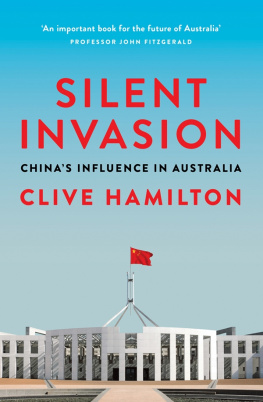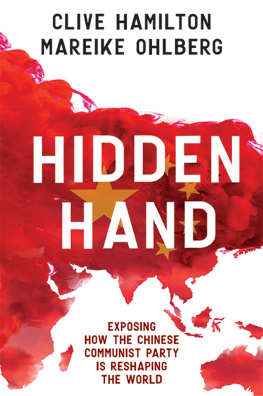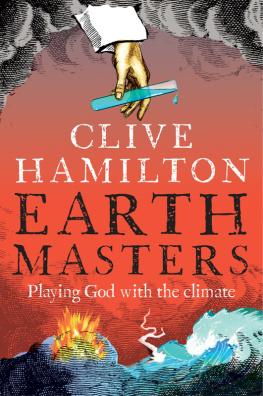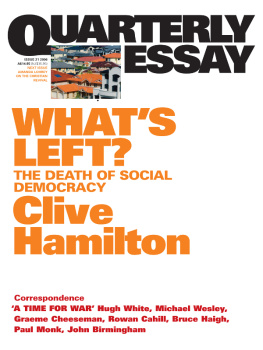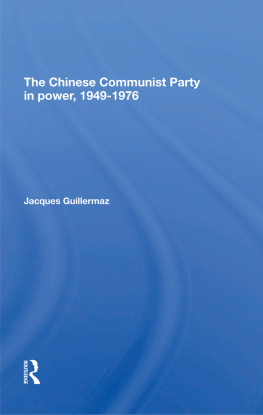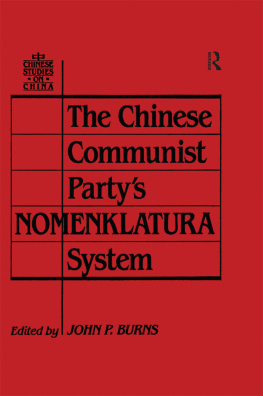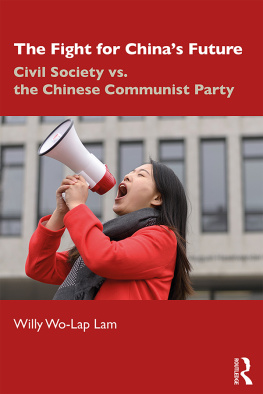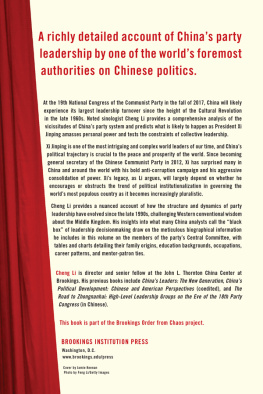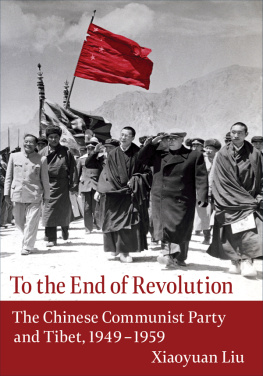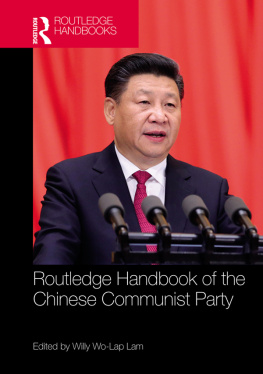Clive Hamilton AM is an Australian author and public intellectual. His books include Growth Fetish, Silencing Dissent (with Sarah Maddison) and What Do We Want: The Story of Protest in Australia. He was for 14 years the executive director of The Australia Institute, a think tank he founded. For some years he has been professor of public ethics at Charles Sturt University in Canberra.
Anyone keen to understand how China draws other countries into its sphere of influence should start with Silent Invasion. This is an important book for the future of Australia. But tug on the threads of Chinas influence networks in Australia and its global network of influence operations starts to unravel.
Professor John Fitzgerald, author of Big White Lie:
Chinese Australians in White Australia

Contents
On 24 April 2008, the Olympic torch arrived in Canberra on the last leg of its worldwide relay in preparation for the Beijing Games. I went along to the lawns outside Parliament House to lend quiet support to the Tibetan protesters. I had no idea what I was walking into. Tens of thousands of Chinese students had arrived early and their mood was angry and aggressive. As the torch approached, the pro-Tibet protesters, vastly outnumbered, were mobbed and abused by a sea of Chinese people wielding red flags. Everyday Australians whod turned up complained later that they were jostled, kicked and punched. Some were told that they had no right to be there. The police presence was too small to maintain order and I feared a riot would break out and people would be severely beaten or worse.
What happened that day left me shocked. Where did all of those people come from? Why were they so frenzied? And I was affronted. How dare they arrive, on the doorstep of our parliament, the symbol of our democracy, and shut down a legitimate protest, leaving me and a few hundred others feeling intimidated for expressing our opinion?
I had no answers, the world moved on and everyone seemed to forget about it. But the incident left a nagging question at the back of my mind. Eight years later, in August 2016, a political storm engulfed Senator Sam Dastyari (which would a year later lead to his exit from parliament). Among the many revelations to emerge over the next couple of weeks was that a handful of very rich Chinese and Chinese-Australian businessmen had become the largest donors to our major political parties. They had bought a lot of influence; our politicians were in bed with them and there were photos to prove it.
China and Australian democracy had collided again. Something big is going on, I thought. I decided to investigate and write a book so that Australians could understand what has been happening to our country.
I had no inkling when I began that publishing this book would prove so challenging. My usual publisher, Allen & Unwin, was enthusiastic about the book when I proposed it and we soon signed a contract. But just as the revised manuscript was about to be sent to be typeset, Allen & Unwin told me they were pulling the plug. They were afraid of retaliation from Beijing, or people in Australia acting on behalf of the Chinese Communist Party. When their withdrawal became public it attracted worldwide media coverage, but it left me without a publisher. Other publishers were scared off. Fortunately, Sandy Grant at Hardie Grant Books took up the challenge. In 1987, Sandy published Spycatcher, a book the British government attempted to ban.
What about the Yanks?
When I mentioned to some that I was writing a book about the growing influence of the Chinese party-state in Australia, this was their first response. What about the Pine Gap spying base, they said, and how we slavishly followed the Americans into the Iraq War? Weve already given up our independence, havent we, so whats the big issue with China?
I hope those people will read this book and see that there is a world of difference. Australia may have sacrificed some of its independence, mainly in defence policy, to be in an alliance with the United States, although the degree is open to debate. But after decades of American colonialism do we really feel that our daily lives or democratic freedoms are constrained by this foreign power?
We share the guilt with the United States for the post-2003 disaster in Iraq, but through the decades of the close relationship our big ally has never threatened to take away our freedoms. The United States never had the kind of economic leverage over Australia that China has, nor made threats to damage us if we did not toe its line. It hasnt endangered our democratic system of elected governments, and its government has never used money to buy off our politicians. The United States hasnt attempted to erode the rule of law. Nor has it attempted to mobilise a diaspora to oppose Australian policy. The United States government has never shut down dissenting views in Australia, even ones harshly critical of the USA. Can we imagine a United States government using our laws to frighten publishers into dropping a book criticising it? Within the alliance, the rights of women and gay people have blossomed because of a flourishing civil society, and the rights of minorities have been protected.
When the Berlin Wall fell in 1989, people in the West breathed a sigh of relief because we would no longer have to live under the cloud of Cold War thinking or with the ideological divisions that troubled our societies. Who wants to go back to that? But the Cold War never ended in Asia. In fact, as we will see, the collapse of communism in Eastern Europe gave rise to a fierce intensification of Chinas ideological war and a consolidation of the Leninist party, especially under President Xi Jinping.
Many in the West, especially after the eclipse of Maoism in the 1980s, have looked upon China as a friendly giant beset by insuperable internal challenges, whose political rhetoric of running dogs and imperialist wolves was a kind of theatre. Now that China is the second-ranked economic power in the world (first by some measures), condescending attitudes towards the Middle Kingdom have become dangerous. They blind us to the deadly seriousness with which Beijing sees its rivalry with the West. The Cold War in Asia may no longer be about communism versus capitalism but it remains just as firmly rooted in the deeper struggle that pitted the West against the Soviet Unionthe struggle over who will prevail.
When I began researching this book in late 2016 there were a handful of people who argued that the Chinese Communist Party (CCP) is engaged in a systematic campaign to infiltrate, influence and control the most important institutions in Australia. Its ultimate aim, they said, is to break our alliance with the United States and turn this country into a tribute state. I knew we had a problem, but this seemed farfetched. As I delved deeply into the problemincluding speaking to dozens of experts, specialists and close observers in Australia, China and elsewherethe evidence for these claims began to seem robust.
According to one person extremely well placed to know about this campaign (named below), it all began in the middle of August 2004 when China brought together its envoys from around the world for a conclave in Beijing. Communist Party Secretary Hu Jintao told the gathering that the partys all-powerful Central Committee had decided that henceforth Australia should be included in Chinas overall periphery. Looking me in the eye, my informant said: This means a lot. China has always devoted special attention to the countries that have a land border with itits overall peripheryin order to neutralise them.
The attention devoted to controlling bordering countries arises from Chinas historical sense of vulnerability. Australia, of course, was always seen as across the ocean and far away. But now Australia was to be treated as a neighbour, within its overall periphery. In Chinas eyes, its territory now extends far to the south of its land border to encompass almost the entire area of the South China Sea. Its recent occupation of islands, and the building of military bases on them, brings Chinas southernmost border close to the northwest coast of Borneo.
Next page
